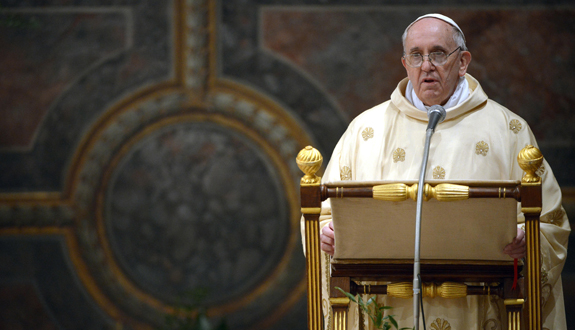

A few days after the election of Pope Francis, Carl noted: “An emerging theme of the young pontificate seems to be that of spiritual battle against the devil, expressed in direct, simple language.” At that point, Pope Francis had already referenced the Devil and spiritual warfare two times in as many days: in his first homily as pope and in his address to the college of cardinals the following day. Since then, Pope Francis has added to this list, including references to the Devil and demonic temptations in his Palm Sunday homily and in his most recent tweet.
Writing for the British Spectator, Piers Paul Read picks up on the new pontiff’s obvious concern about the activity of Devil in the modern world, and ponders what it might mean for the faithful:
Today we hear [the Devil’s] name more frequently in lectures on English literature than in seminars on theology. Films about demonic possession and exorcism still send shivers down the spine, but we know it is make-believe. The precipitous decline in Britain in the number of those who believe in God was long preceded by the disappearance of the Devil even from the cognizance of Christian believers.
Is this about to change? Soon after his election, Pope Francis told the College of Cardinals not ‘to give in to the pessimism, to that bitterness, that the Devil places before us every day’. More radically, in his first homily as Pope, he quoted the French author from the turn of the 20th century, Léon Bloy: ‘He who does not pray to the Lord prays to the Devil.’ Bloy was a zealous, even belligerent Catholic: he believed, like Pope Francis, in spiritual renewal through poverty and suffering, and eschewed any compromise with the world.
… Liberation theologians talked of sinful structures, but according to orthodox Christian teaching, the cosmic struggle between good and evil is played out in the soul of each individual human being: salvation or damnation are personal, not collective. Today we tend to point to world-historical villains such as Hitler, Stalin or Pol Pot as the epitome of evil; and, closer to home, perhaps to a paedophile priest or a Jimmy Savile.
… With Peter Sutcliffe and Jimmy Savile, there is no divergence about good and evil between the view taken by the Catholic Church and that of our secular society. More problematic is an issue such as same-sex marriage. Most secularists and some Christians regard it as right and just: however when it was passed into law in Argentina, it was denounced by Pope Francis, then the Archbishop of Buenos Aires, as the work of the Devil. ‘At stake is the total rejection of God’s law engraved in our hearts. Let us not be naive: this is not simply a political struggle, but it is an attempt to destroy God’s plan. It is not just a bill… but a move of the Father of Lies who seeks to confuse and deceive the children of God.’
Do read the whole thing. And, for a personal account of the demonic at work in the world, check out today’s featured article on the CWR homepage, an interview with a former Satanist who found her way back to the Catholic Church after decades of dabbling in the occult.
If you value the news and views Catholic World Report provides, please consider donating to support our efforts. Your contribution will help us continue to make CWR available to all readers worldwide for free, without a subscription. Thank you for your generosity!
Click here for more information on donating to CWR. Click here to sign up for our newsletter.


